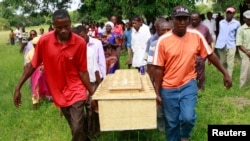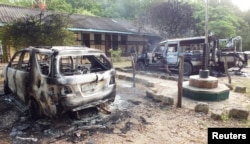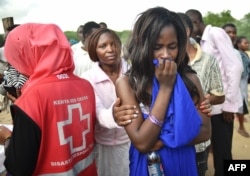For three days, gunmen from al-Shabab attacked the coastal town of Mpeketoni, southwest of Lamu. Sixty people were killed in the town, which is inhabited mostly by the ethnic Kikuyu community from central Kenya. The attack sparked outrage and division within Kenyan society. One year on, Mpeketoni and neighboring towns are still under curfew.
On June 15, 2014, a group of armed men from al-Shabab struck the coastal town of Mpeketoni. They attacked a police post and then killed any person they saw.
It was the days of attacks that followed that no one had predicted. The armed men continued attacking other small towns and villages surrounding Mpeketoni.
The population hid in police stations, hospitals and churches.
The 50,000 people who live in Mpeketoni however, thought they were protected from the militant group based in Somalia.
The 50,000 people who live in Mpeketoni however, thought they were protected from the militant group based in Somalia.
Human rights
One year later the mother of two says she feels safe because there is a heavy security force presence in her area.
However, U.S.-based Human Rights Watch, in a report Monday, says the attack was followed by abuses by Kenyan security forces in Lamu County.
The 53-page report titled "Insult to Injury" documents failure by the security agencies to protect civilians from al-Shabab and to properly investigate the killings, and documents law enforcement operations marred by abuses.
Kenya interior spokesman Mwenda Njoka admits some officers might have behaved in a manner that is against the law.
“Possibly there may be two or three incidents but it's not a policy, the policy of the government is to ensure that they deal with criminals as criminals not as Muslims, not as Kikuyus not as Luos,” said Njoka.
Security analyst George Musamali says the government and security agencies' behaviors were questionable.
“The government played into their hands by claiming this was a political thing, not an al-Shabab attack, and at the end of the day al-Shabab looked like they have won this one because the government didn’t handle it well, the media briefing they were giving were actually not the truth as it was on the ground,” he said.
Shift in al-shabab attacks
Musamali adds that al-Shabab is shifting its area of operation.
“The fact that now they are hitting Garissa more than any other part probably they shifted the focus from the coast where we have very big presence of security agencies to an area they believe now it’s a soft target and this is in northeastern Kenya,” he said.
For the past two months, al-Shabab militants have carried attacks in villages near Garissa — two where the group stormed a University killing 148 people, mostly students.
On the eve of the Mpeketoni attack anniversary, the Kenyan army said it killed 11 members of al-Shabab during an attack on a military camp.
Kenya is faced with enormous security challenges, says Human Rights Watch, but the authorities have an obligation to respond effectively and protect rights at the same time.
The group warns Kenya a response that ignores basic rights is not effective, and only risks making the situation worse.






